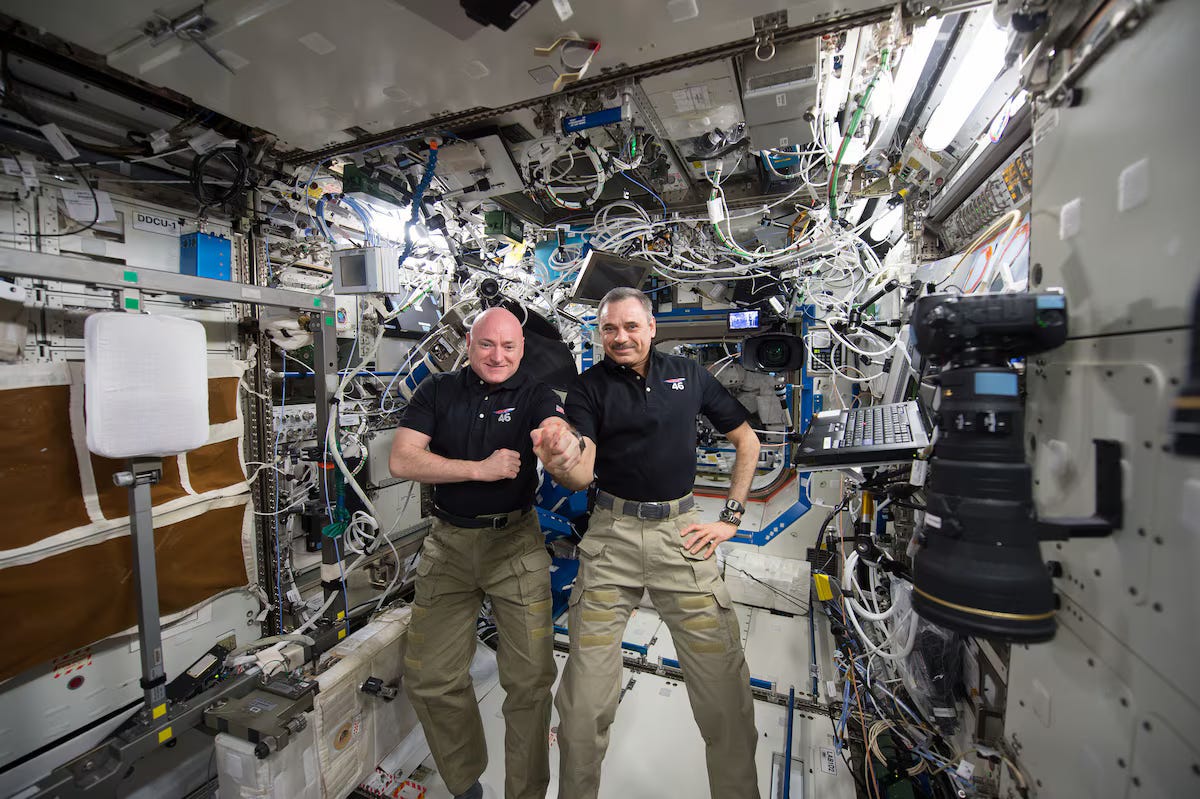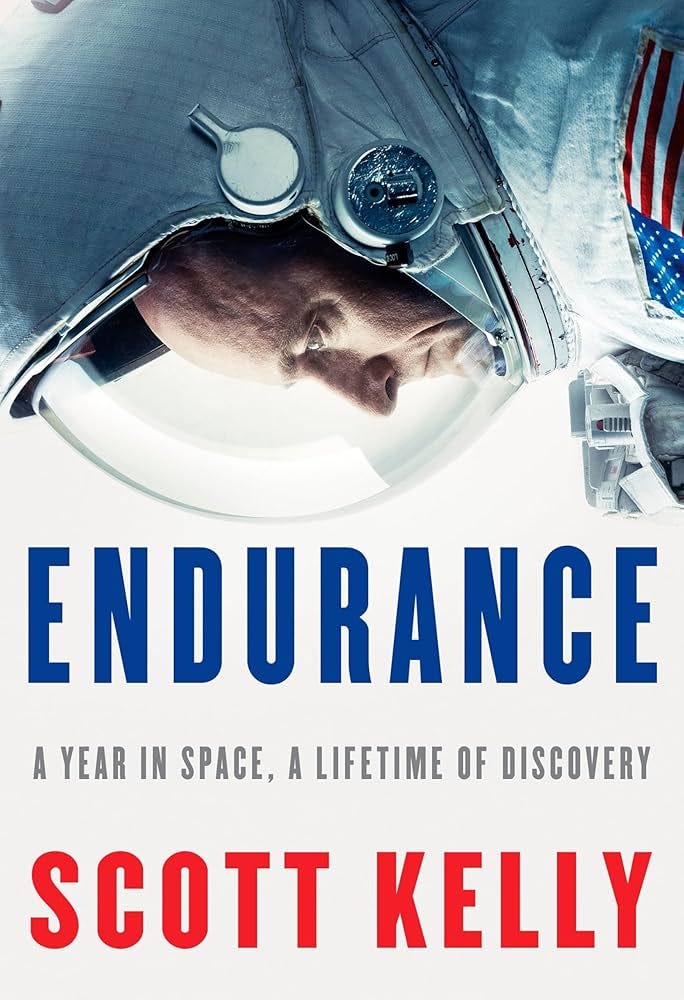Endurance: A Year in Space, A Lifetime of Discovery by Scott Kelly
Make Space on Your Bookshelf
Endurance: A Year in Space, A Lifetime of Discovery by Scott Kelly, published in 2017, chronicles his record-setting year aboard the International Space Station. Kelly details daily life, spacewalks, and the physical challenges of long-term space travel, while exploring the psychological and emotional toll of isolation, family separation, and working in confined quarters under high pressure.

Read This Book to Better Understand …
How Americans and Russians collaborate in high-stakes, confined environments, overcoming language barriers, distinct spacecraft systems, and their countries’ political conflicts, building trust that often extends into genuine friendships.
The physical toll of extended space travel, including CO2 buildup from system failures or increased crew oxygen consumption.
The reliance on timely spacecraft deliveries for vital supplies and waste removal.
The impact of the NASA Space Shuttle program’s demise and subsequent dependence on Russian Soyuz rockets until SpaceX took over astronaut transport.
The traditional path from Navy test pilot to NASA astronaut.
Implications for Space Tourism …
Though not explicitly mentioned, considering specialized roles on the ISS described by Kelly, the 18 tourists who have visited so far likely created an odd dynamic among highly skilled astronauts and increased risk as deadweight, despite their pre-voyage training.
Greater spacesuit flexibility and spacewalk risk reduction are needed for space tourists to participate safely in this activity.
SpaceX suits, introduced after the book’s publication, show improvements in advanced joint designs and rotational elements to allow astronauts to move more freely, but many of the challenges and risks remain.

Book Summary and Excerpts
In Endurance, astronaut Scott Kelly shares his year aboard the International Space Station (ISS), setting a record for the longest continuous time an American has spent in space (340 days). The memoir intertwines Kelly’s experiences in orbit with reflections on his childhood, career, NASA training, and struggles, offering an inspiring and deeply human view of space travel.
In this excerpt, Kelly explores his personal growth, recounting the pivotal moment when he committed to becoming a top pilot and astronaut:
"In my freshman year, I started out with great hope that I could turn things around and be a good student, as I had every previous school year. This determination always lasted just a few days, until I realized once again that it was impossible for me to concentrate in class or to study on my own. Soon I was waking up each morning and struggling to think of a reason to go to class, knowing I wouldn’t absorb any of the professor’s lecture. Often, I didn’t go. How was I going to graduate, let alone do well enough to be accepted by any medical school? Everything changed that afternoon when I picked up The Right Stuff.
… I wanted to be like the guys in this book, guys who could land a jet on an aircraft carrier at night and then walk away with a swagger. I wanted to be a naval aviator. I was still a directionless, undereducated eighteen-year-old with terrible grades who knew nothing about airplanes. But The Right Stuff had given me the outline of a life plan."
He reflects on his early Space Shuttle missions, the thrill of launches, and the inherent dangers of spaceflight, touching on the Columbia and Challenger disasters that shaped NASA’s safety protocols and his own approach to risk. These experiences deepened his appreciation for life, teamwork, and the balance between ambition and caution.
Kelly shares insights into his experiences with the Soyuz spacecraft, contrasting NASA and Russian operations, from training to equipment. Despite political tensions, he emphasizes the importance of collaboration, mutual respect, and shared goals in maintaining the space station and advancing exploration.
Here he describes a gathering in which arriving astronauts are welcomed at the weekly dinner on the Russian side of the ISS:
"We head back to the Russian segment for a traditional welcoming party—special dinners are held there every Friday night and on other special occasions, including holidays, birthdays, and good-bye dinners before each Soyuz leaves. Welcoming parties are one of those occasions, and Terry has warmed up my favorite, barbecued beef, which I stick to a tortilla using the surface tension of the barbecue sauce (we eat tortillas because of their long shelf life and lack of crumbs). We also have the traditional foods we share at Friday night dinners—lump crabmeat and black caviar. Everyone is in a festive mood."
Kelly shares the intense physical and psychological challenges of long-duration space travel, detailing effects like muscle atrophy, bone density loss, and fatigue, while facing isolation and monotony. His twin brother, Mark Kelly, (the brothers are highlighted in our “Family Matters in Space” article) played a key role in NASA’s twin study, allowing comparisons between Scott’s body in space and Mark’s on Earth, providing unique insights into the effects of space travel on human health.
"I make it to the bathroom, flip on the light, and look down at my legs. They are swollen and alien stumps, not legs at all. … I have a strange rash all over my back, the backs of my legs, the back of my head and neck—everywhere I was in contact with the bed. … Normally if I woke up feeling like this, I would go to the emergency room, but no one at the hospital will have seen symptoms of having been in space for a year. … As I try to will myself to sleep, I wonder whether my friend Mikhail Kornienko is also suffering from swollen legs and painful rashes—Misha is home in Moscow after spending nearly a year in space with me. I suspect so. This is why we volunteered for this mission, after all: to discover how the human body is affected by long-term spaceflight."
Kelly emphasizes the importance of persistence and curiosity and reflects on how seeing Earth from space gave him a newfound appreciation for its fragility and the need to protect it. Endurance offers insights into daily life in space, highly relevant both for space travel and lifestyle. This book is a highly recommended by Spaceport Lounge as a compelling, foundational read.
*How to Read or Listen to this Book:
For US residents, both the book and audiobook should be available free at your public library checkout counter or online via the Libby App.







